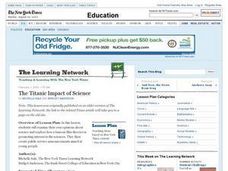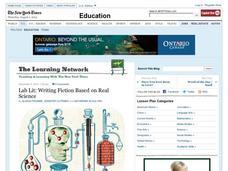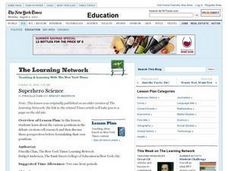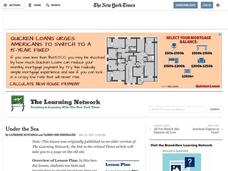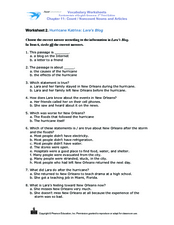Curated OER
Blog Your Truth
Students explore communication by participating in a digital journalism activity. In this aboriginal research instructional activity, students view a sample blog on the Internet and identify the techniques behind blogging and Internet...
Curated OER
The Titanic Impact of Science
Discuss personal ideas about science and how a filmmaker can employ the arts to promote science. After reading an article, young scientists will discover how James Cameron is trying to interest people in the oceans. In groups, they will...
Curated OER
Playing With Science
Young scientists investigate the scientific concepts and principles that help make common toys such as hula hoops, yo-yos, slinkies, and silly putty work. As a class, they read "Backyard Rocket Science, Served Wet" to get a look behind...
The New York Times
Writing Fiction Based on Real Science - NYTimes.com
Refuse to alienate your scientific-minded young scholars during your creative writing unit. Learners explore how literary writing can reflect observable fact, and be based in actual science. The links include examples of fiction and...
Curated OER
What Science Suggests About 'Weather Weirding'
Here is an activity that you can use to help upper elementary or middle schoolers to meet Common Core literacy standards for science and technology. Youngsters read the article on extreme weather patterns, "Weather Runs Hot and Cold, So...
Curated OER
Pandas, Flamingos and Blogs
Students use the computer to discover animals. In this animal lesson, students look at online webcams to view animals and write in a daily blog discussing what the animals are doing. They use either Pixie or PowerPoint to create an...
Curated OER
Short and Sweet Science
Readers learn how to summarize scientific text and evaluate the advantages, disadvantages, and challenges in writing summaries. They select science-related articles you've pulled and collected from the New York Times and, with a partner,...
Curated OER
Bringing Facts Into Science Fiction
Students develop a setting, plot and characters for a science fiction story based on current news themes, and then individually write drafts of the story.
Curated OER
Superhero Science
Young scientist explore the various positions in the debate on stem cell research and then discuss these perspectives before formulating their own positions. They must research the topic and beliefs that others have. They will also look...
Curated OER
Science on the Skids
Students discuss the decline in the sciences in America by comparing statistics and information from the U.s. to other countries. Then they write and deliver a "State of the Sciences" address to their peers.
Curated OER
Hic-Hic-Hooray!
What is really the best way to get rid of hiccups? Investigate some old wives' tales and folk remedies related to health. Middle schoolers explore the science behind why people might believe these myths to be true and find the real...
Curated OER
Under the Sea
Young scholars imagine and describe fictitious sea animals that might live in the ocean. After reading an article, they reflect on new discoveries found in the ocean recently. Using the internet, they research the interdependence of...
Curated OER
E.T., Are You Out There?
Research the necessary components of a planet that supports life after reading the article "All of a Sudden, The Neighborhood Looks a Lot Friendlier" from The New York Times. After finding their information, middle and high schoolers...
Curated OER
Hurricane Katrina: Lara's Blog
In this Hurricane Katrina Worksheet, students choose the correct answer to each of the 8 multiple choice questions, using the information in Lara's Blog.
Lee & Low Books
First Come the Zebra Teacher’s Guide
Accompany a reading of First Come the Zebra written and illustrated by Lynne Barasch with a teacher's guide equipped with before reading, vocabulary, and after reading activities. Additional social studies,...
Curated OER
Does Mother Nature Know Best?
Investigate herbal medicine in the science or health classroom with this lesson from the New York Times. After a discussion about class members beliefs about and experiences with herbal medicines, pupils read an article that might...
Curated OER
Mission Complete, Houston
It was a bittersweet event when the space shuttle Atlantis touched down for the last time on July 21, 2011. Space science learners read an article about this event in The New York Times and then write answers to who, what, where, when,...
Curated OER
2011 Nobel Prize Winners Announced
This assignment has young scientists read four different news articles about the 2011 Nobel Prize winners. Six questions are posed for children to write the answers. It is a relevant activity for getting middle schoolers to meet the...
Curated OER
Fruitful Questions
Students examine a fruit-related Q & A Science Times article. They write their own food science questions and answer them in the same format as the article. For homework, they analyze their fruit consumption according to U.S....
Curated OER
School Announcement Blog
Students become bloggers. In this technology lesson, students use video and image editing to add to an online school announcement blog that they maintain.
Curated OER
Acid Rain
Create a simulation of acid rain in your classroom with lemon juice and bean plants to help kids study the effects of pollution on plants. In addition, learners will listen to a story and write responses based on guiding questions.
Curated OER
Sun and Shadows
Why do shadows look different in the summer than in the winter? What causes day and night? How can a sundial be used to tell time? Answer these questions and more through two engaging lessons about light and shadows. Fourth and fifth...
Curated OER
Science in the Court Room
Share their opinions on the use of DNA databases in criminal investigations. After reading an article, they evaluate the pros and cons of the databases and work in groups to answer discussion questions. They write a letter to a state...
Bethel School District
Observations and Inference
What's the difference between qualitative and quantitative observations? Learners make observations, inferences, and predictions about their environment with a set of questions and activities that are applicable to either language...

